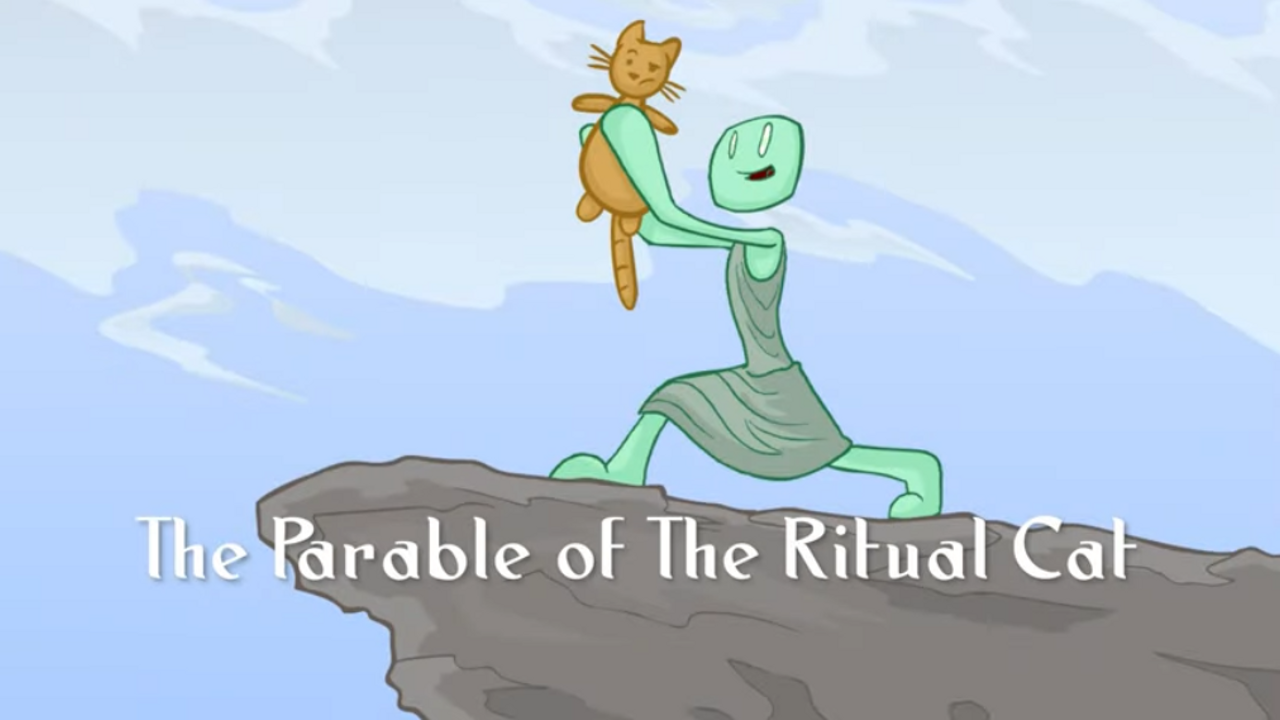The Parable of the Ritual Cat

The once was a great monastery high up in the mountains of Tibet.
One day, when the spiritual teacher and his disciples began their evening meditation, the cat who lived in the monastery started making noise.
So much noise that it completely distracted them. So the teacher ordered that the cat be tied up during the evening practice to meditate in peace.
Years later, when the teacher died, tying up the cat continued during their meditation sessions. And, when the cat eventually died, another cat was brought to the monastery and tied up.
Centuries later, learned descendants of the spiritual teacher wrote scholarly treatises about the religious significance of tying up a cat for meditation practice.
The Parable of the Ritual Cat is a story about the questioning of authority and rituals. Today, there are endless rituals, beliefs, and ideas about the world that extend back into views from ancient times. But how many of these are our own, and not someone else’s that have been passed on to us? This parable highlights our attitude to authority and the ever pervading belief that just because someone is an expert in something, doesn’t mean that they’re right 100% of the time.
Logically speaking, the monks could have just let the cat out and shut the door when meditating, which would probably have been much better for the cat! But because their learned master made the decision, later monks attributed great significance to an event that they weren’t even around to see! This parable reminds me of the old children's game “telephone/Chinese whispers,” where you would whisper something into someone's ear, and then the message would be passed along from one kid to the next. By the time it got to the last kid, the message wouldn’t be anything like it was when it started.
Maybe this is how silly superstitions develop. You’ve probably heard the phrase “all myths have some element of truth” or “there’s no smoke without fire,” which say that there’s always a cause and origin story to our favorite myths, but over time it gets distorted as it passes from one generation to the next. Eventually, you’ll have a generation of people who believe something entirely different from what it used to be.
There’s also something to be said for interpreting ancient traditions from a modern perspective. We should always remember that way back in the old days when many of our legends and myths developed, society was very different. Morality and social dynamics were considered differently, and people lived fundamentally different kinds of lives. Just because a tradition developed a thousand years ago, doesn’t always mean it will work today without going through a bit of a change. Maybe the monks could have just got a cat crate!
This story always makes me wonder how many seemingly “spiritual” or “mystical” traditions began as practical solutions to everyday problems. A funny example is found in the British Iron Age, where for years archaeologists thought the position of the door and entrance in roundhouses was because of some spiritual or mystical reason in their mythology…..linguists even spent years looking for symbolism in Medieval texts until someone had the bright idea that, by looking at where the central fire and livestock would have been in the village, most of the doors were facing the other way to avoid the smell of the cows and the smoke from the fire!
I think the most important takeaways from this parable are always to question your beliefs and try to adapt them with the times. Ever think about the reason you’re doing stuff, and if it makes sense to you. And while there is something to be said for trusting experts who have devoted their lives to their field, imagine yourself as the highest authority in your beliefs.
I think a lot of us live our whole lives like this. We do this and that, over and over again, without really thinking about the significance or meaning of it. And if we stopped to look at some of our traditions, we might see that someone or something always suffers from undesirable, superstitious behavior. Take black cats; for example, there’s a common superstition that if one crosses your path, it’s often considered bad luck….but in parts of Europe and England, it’s good luck! How many black cats have missed out on adoption because people thought they were unlucky??
Ultimately, this story is more about the failings of people than rituals, cats, or scholars…..
A Mystery School For The New Age...
In late 2019, Spirit Science launched a one-of-a-kind educational platform ~ Spirit Mysteries ~ as an online space for self-mastery. It has grown rapidly, and now contains hundreds of hours of courses and thousands of students from across the world.
If you are ready to take your spirituality to the next level, click below to get started.



